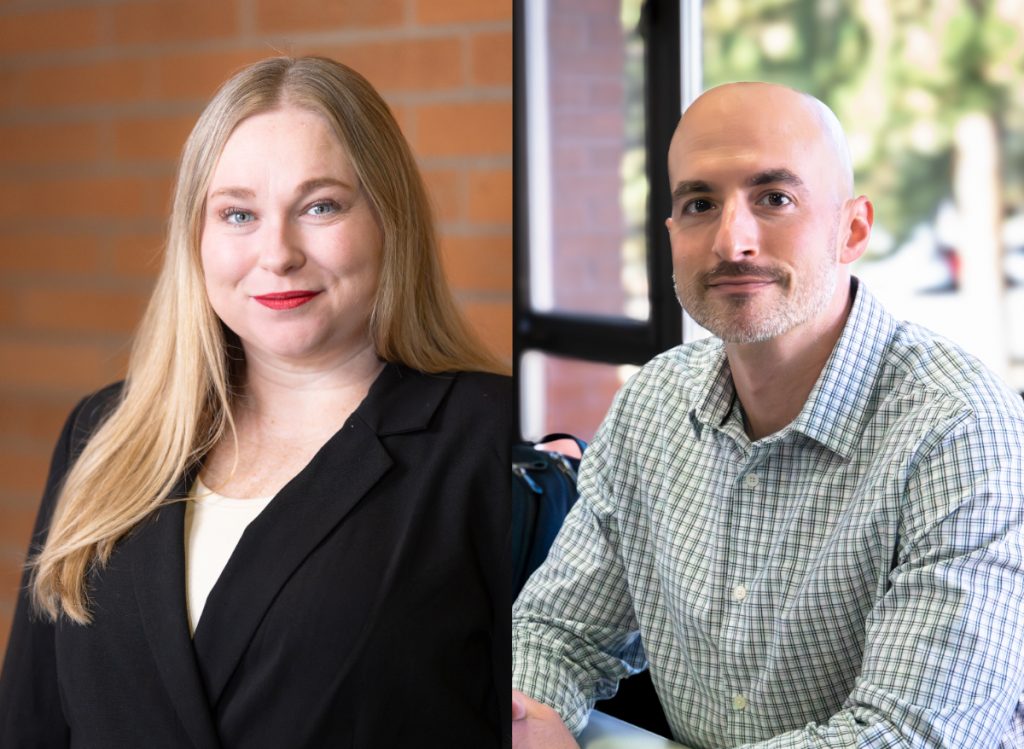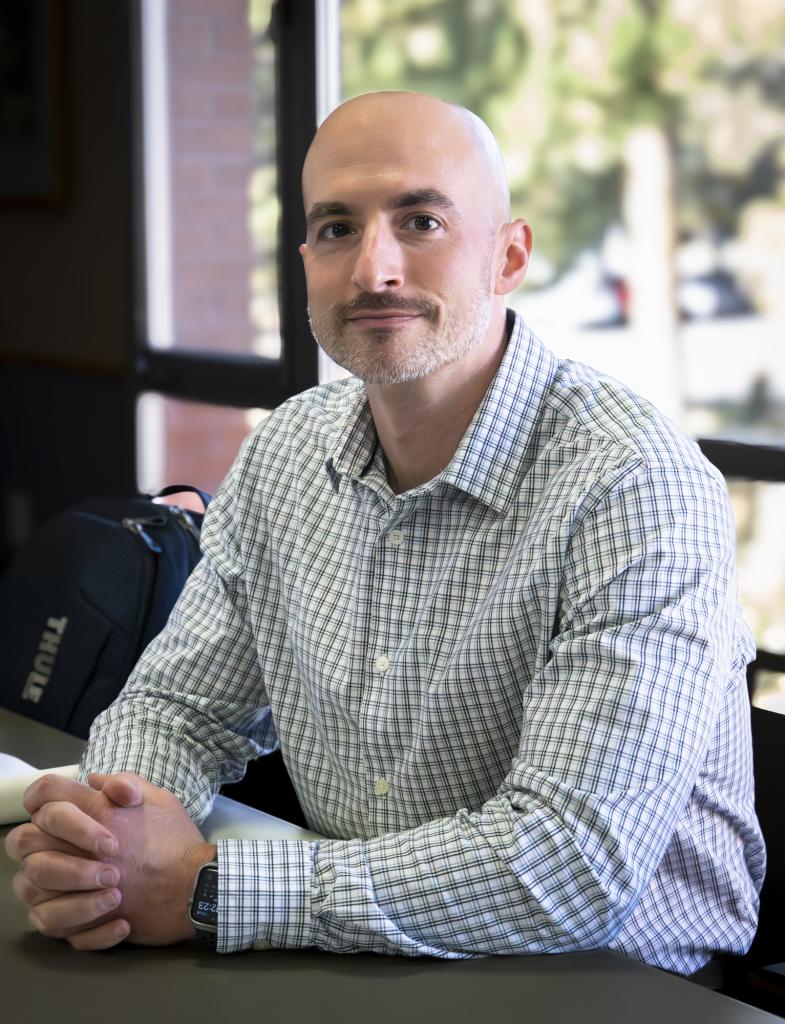CHER Researchers Selected as Flinn Early Career Faculty Fellows

The Center for Community Health and Engaged Research (CHER) is proud to celebrate two of our affiliated faculty members, Dr. Michael Anastario and Dr. Tara Bautista, for being selected as Flinn Early Career Faculty Fellows at Northern Arizona University (NAU). This prestigious fellowship recognizes outstanding early-career faculty who are poised to make significant contributions to research in the biological and health sciences.
The Flinn Early Career Faculty Fellowship, supported by the Flinn Foundation, provides recipients with $200,000 in research support over a 2-year period, with the possibility of an additional year of funding. These funds are designed to help faculty members build their research agendas, generate pilot data for competitive grant applications, and develop high-impact proposals to secure external funding.
NAU’s Flinn Early Career Faculty Fellows
Dr. Mike Anastario

Dr. Anastario, a faculty member in the Department of Health Sciences and a sociologist in the field of community health research, expressed the benefits of receiving this award.
“The fellowship provides funding that advances my research integrating social science methodologies with toxicology. Specifically, the award supports two primary research areas examining elemental mixtures, with an emphasis on heavy metals: 1) assessing metal exposures among people who inject methamphetamine and 2) exploring biosocial pathways of metal contamination in avocado supply chains.”
His work focuses on exploring ways to reduce the harm caused by contaminated methamphetamine. Instead of only encouraging people to abstain from substance use, he studies how to remove toxic heavy metals from methamphetamine using different scientific tools and methods. His work blends quick field testing, lab analysis, and conversations with people who use methamphetamine to find practical ways to make it less dangerous. Along with his research in harm reduction with people who inject methamphetamine.
He is also conducting collaborative fieldwork investigating metals in the Mexican avocado supply chain through a partnership with Dr. Cynthia Armendariz Arnez at the Escuela Nacional de Estudios Superiores, Unidad Morelia, Universidad Nacional Autónoma de México (ENES-UNAM Unidad Morelia).
“The support received from the fellowship advances research on metal mixtures found in specific food and drugs, enhancing our understanding of their health effects, and informing interventions to reduce harmful exposures.”
The Flinn Fellowship not only benefits the recipients but also has far-reaching impacts on the university, students, and the broader community. By supporting innovative research in health and biological sciences, the program helps advance NAU’s mission of fostering impactful, solutions-driven research that improves public health outcomes.
For students, working alongside Flinn Faculty Fellows provides invaluable research training and mentorship, equipping them with the skills to contribute to community health research.
“[The fellowship] provides NAU students opportunities to engage in interdisciplinary research, gain hands-on experience with advanced analytical techniques, and participate in community-oriented fieldwork.”
Anastario is planning to integrate findings from this research into biostatistics course labs for next semester. Simultaneously, students and scientists at ENES-UNAM Unidad Morelia will participate in international collaboration and cross-cultural academic exchanges aimed at enhancing cross-cultural understanding of environmental health issues, food safety practices, and international agricultural supply chains.
Dr. Tara Bautista

As an assistant professor of psychological sciences and leader of NAU’s Stress and Health Equity Research Lab, Dr. Bautista’s research interests include stress and substance use disorders among underserved populations and adapting evidence-based interventions to reduce health disparities. Her current work, funded by the Southwest Health Equity Research Collaborative’s (SHERC) Pilot Project Program (PPP), focuses on adapting a mindfulness-based intervention for Latina mothers who drink alcohol to cope with stress.
Dr. Bautista expressed gratitude in detailing the expected outcomes from receiving this fellowship:
“Receiving the Flinn Foundation Early Career Award is an honor. I appreciate the review committee members seeing the potential in my research and wanting to make this investment not only in my science, but in me as a rising scholar seeking external funding to support my program of research.”
Dr. Bautista plans to utilize her funding in a few different ways. She aims to:
- Reduce her teaching load from six classes to two classes a year, which allows more time for time-intensive research, while still working with students in the classroom.
- Purchase ecological momentary assessment (EMA) software to monitor changes in stress and coping behaviors day-to-day among her stress reduction clinical trial participants.
- Hire student research assistants which allows them to receive training, tuition remission, and a stipend. Some of these students may also use these data for their theses or dissertations.
- Foster community building within NAU and outside of the university.
Bautista is already finding ways to utilize this funding to support NAU early career faculty through a weekend writing retreat. The retreat facilitated collaboration among faculty researchers and provided guidance in the grant and manuscript writing process.
Along with the writing retreat, she is planning a “Dia de las Madres” event in May. This event will provide stress reduction education and behavioral skills training to local mothers with free food and activities for the family. They will also be recruiting eligible mothers for their ongoing studies at the event.
While new to the Flinn Early Career Faculty Fellowship, Bautista is no stranger to funding opportunities offered through initiatives like SHERC. Along with her pilot project researching alcohol as a coping mechanism among Latina mothers, she is also a recipient of SHERC’s Community-Campus Partnership Support (CCPS) Program.
As an awardee of the tenth round of CCPS funding, her project titled “Collaboration with Promotoras to Develop Stress Reduction Practices for Farm Workers” explores opportunities with the farmworker advocacy group Campesinos Sin Fronteras (CSF). CSF employs community health workers (promotoras) who are trained and certified as train-the-trainer educators by the Arizona Department of Agriculture. Through the CCPS Program, CSF and Dr. Bautista are building trust, generating an understanding of community needs and desires, and identifying ways to tailor the program/s to fit the needs of specific groups within the community.
Impacts for CHER
This fellowship strengthens CHER’s role as a hub for cutting-edge research in community health, providing additional momentum for projects that address pressing health concerns in Arizona and beyond. Both Dr. Anastario and Dr. Bautista’s work align closely with CHER’s commitment to community engaged research, ensuring that their research not only advances scientific knowledge but also leads to meaningful, real-world improvements in health and well-being.
Please join us in congratulating Dr. Anastario and Dr. Bautista on this remarkable achievement. We look forward to seeing how their research flourishes with this well-deserved support.